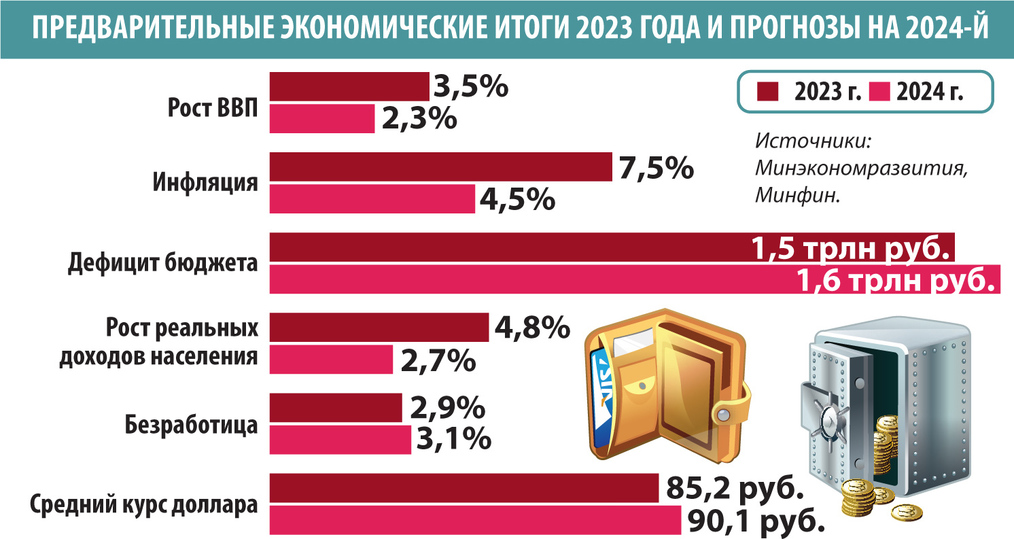«You shouldn't wait for GDP to grow and wages to rise»
Official statistics indicate that the past year was successful for the Russian economy. GDP growth is expected to be higher than official forecasts. At the same time, real incomes and wages of the population are growing in the country, Russians are receiving high interest on deposits, and unemployment has fallen to almost zero. And all this despite the increasing sanctions pressure from the West. But has life really become easier for the average Russian? How did the events of 2023 affect the well-being of the population? Will these trends continue in 2024? This was discussed live at the MK press center by the chief researcher of the Institute of Economics of the Russian Academy of Sciences, Doctor of Economic Sciences Igor Nikolaev, financial analyst, Candidate of Economic Sciences Mikhail Belyaev and analyst of the Capital Skills Financial Academy, Candidate of Economic Sciences Mark Goikhman.
 < span itemprop="height" itemscope itemtype="https://schema.org/QuantitativeValue">
< span itemprop="height" itemscope itemtype="https://schema.org/QuantitativeValue">
< img src="https://static.mk.ru/upload/entities/2023/12/20/18/articlesImages/image/72/c3/c7/2d/a7f47fbef51675343f564b68662fae37.jpg" class="article__picture-image" alt ="" />
— 3.5% economic growth is certainly a success. Firstly, the growth rate itself is not small. And secondly, gross domestic product is the starting point for all other economic parameters. At the same time, I would like to add a grain of salt to this “sweet” statistics. The growth, in my opinion, occurred mainly due to the impact of the military-industrial complex (MIC). What is its specificity? Military-industrial complex products practically do not participate in capital turnover. That is, formally this is a plus, but in fact it is a deduction from the national economy, except for that part of military equipment that is sold abroad. Of course, one cannot help but admit that the military-industrial complex still sends waves of positive ripples throughout our economy, giving orders for metal, chemicals, textiles, rubber, research and development, etc. This is, of course, great. But we must understand that military-industrial complex products do not go beyond the battlefield or warehouse hangar.

— This year can be called successful for our economy. But not without reservations. In Russia there are two main macroeconomic indicators: GDP and inflation. If GDP is 3.5%, this is certainly very good. Because the expectations were much lower. But with regard to inflation, the situation is the opposite. According to it, the target figure was 5.5%, but now we have noticeably more. 7.5% at the end of December is at best, and two percentage points are of great importance for citizens’ wallets. It turns out that we are entering next year with accelerating inflation, and this is not a plus. Second disclaimer. The Ministry of Finance tells us about the budget impulse, that is, that huge amounts of money have flowed into the economy. But this was largely due to defense spending. Note that the Ministry of Finance chose the right word — impulse. And an impulse is something one-time, temporary. It was enough for 2023, and judging by the three-year budget, it will be enough for next year. So what is next? Judging, again, by the budget, this impulse will stop in 2025. This must be kept in mind.

— I agree with my colleagues that overall this year has been successful. But there are some nuances. In 2024, the situation with GDP growth will be more complicated, since it will have to be calculated from a fairly high base of this year. In addition, there are other factors indicating that growth may be fading. This increase in energy prices throughout almost the entire year, which seriously spurred the move away from Russian exports. In addition, the dollar-ruble exchange rate, which rose during three quarters of 2023. Along with the increase in energy prices, this also contributed to the increase in GDP. But next year, it seems, there may be some difficulties here. So there may be some slowdown in the momentum that has been going on this year.
— I take the popular opinion that we are a “gas station country” very calmly. A country should produce what comes easily to it. If we are endowed with such rich natural resources, then why not use them? Many people blame our mining industry. But let's look from a market point of view. The opportunity arose to transfer our oil and gas flows from the West to the East, and to a certain extent we did this. The most important thing is that we produce products—oil and gas—that everyone needs. Therefore, it was easy to redirect the flows. We must also understand that our mining companies are complexes of the highest technological, scientific and technical level. These include new materials, the use of artificial intelligence, robots, and remote control. These are not half-naked aborigines who are scooping oil from some well with dented buckets. These are completely advanced production structures, which in terms of complexity can be compared almost to the space industry. So, these two factors — the demand for goods and high-tech production methods — ensure the stability of the Russian economy. Our mining industry, like the military-industrial complex, provides orders to all other manufacturing sectors for metal, science, new materials, robots and much more. Not to mention the jobs and the infrastructure that is being created around these companies.
— It is a fact that our oil and gas revenues have decreased significantly. But I would not overestimate the situation and say that we have gotten off the oil needle. Actually this is still a question. But we are a country naturally rich in oil and gas. So what now — do we have to give up this competitive advantage? For some reason, no one calls Norway or Saudi Arabia “gas station countries.” It’s just that these states show that you need to wisely manage your competitive advantage. Yes, our oil and gas revenues have decreased significantly, but I believe that this is not critical. We managed to rebuild logistics. Countries such as India and, to a large extent, China have replaced the volumes of other partners in imported resources from Russia. And since oil and gas incomes have dropped, and incomes from manufacturing industries have increased, in the end everything seems to be going well for us. But the question is: how sustainable are these manufacturing revenues, which have largely replaced oil and gas revenues? I'm afraid there will be problems with this. If not in 2024, then in 2025 we will be able to feel them.
— There is no simple answer to a seemingly simple question. Indeed, real disposable income of the population should grow by about 5%. This is a high figure, of course. But the rise in prices that Russians see in stores makes a much more impressive impression. Then, you need to understand that real incomes have increased on average. But for many citizens, these incomes either did not increase at all, or even decreased, and then prices are rising. People go to stores and consider whether they will have enough money today for what they could afford, relatively speaking, last week. And if they understand that now there are not enough funds, this is perceived very painfully. In economics, it is often not so much absolute numbers that are important as dynamics. And prices are rising dynamically. And we are entering next year with this growing inflation. However, according to the government's forecast, inflation next year should be 4.5%. But what will cause such a sharp slowdown in prices? For some reason no one explains this…
— This is the age-old question: what inflation is real? I always compare the flow of inflation to a river. There is always a main stream in the river that flows quickly. There are smaller streams near the coast, and sometimes there are whirlpools somewhere. So calculating inflation can be compared to this very river. The wider the range of goods and services you cover, the lower the numbers will be. Because some things rise in price faster, some slower. As a result, we get a very average, low indicator. But people in reality buy a rather limited range of goods and everyday products. And it is these everyday goods that, under the influence of demand, rise in price the fastest.
— The probability of inflation dynamics increasing beyond the current 7.5% or 8% next year is still small. At the level of high prices this year, their further growth will be limited. In addition, if inflation dynamics decrease, then in the second half of 2024, perhaps by the summer, the key rate will also decrease. That is, bank lending will become cheaper. In this case, interest rates on bank loans will gradually decrease.

< /p>
— I’ll start with the main thing: no, you shouldn’t count on an easier life. Why indulge yourself with illusions? Overall, 2024 will not be a failure, but it will be slightly worse than 2023. However, there is still enough money in the budget for next year. As for the main macro indicators, there will, of course, not be 3.5% GDP growth. It will be around zero, with some tenths of a percent growth possible. As for inflation of 4.5%, I don’t think that this forecast will come true. If we keep single-digit inflation (less than 10%), that's good. So there is no reason to expect that 2024 will be easy.
“Next year will be worse, not better, than this year.” Largely because the economic indicators that Rosstat considers are based on the statistical base of the current year, and it will be quite high. Therefore, a GDP growth of 3.5% is, of course, unlikely. I assume that the growth may be one and a half percent. As for inflation, 4% is unlikely, but less than this year is quite possible. There may be approximately 6.5% inflation in 2024. The dollar exchange rate will be higher than now: 90–110 rubles. Real incomes of the population will be less than now. In general, we can say that life will be a little worse than now, but some kind of catastrophe or collapse will not happen.
— It can be said that there have never been easy times — so you shouldn’t expect them. In fact, life has always been difficult. People need not to sit and wait for GDP to grow and salaries to rise, but to use their own strength and efforts in order to forge their own happiness. Now to the specifics. A high key rate, in my opinion, will prevent the rosy numbers and forecasts from coming true. Therefore, inflation of 4% is unattainable. It will be more likely 7–8%. If we talk about GDP, then I bet on a three percent growth rate. I will even say that it would be a shame if we give less than 3% growth with all our capabilities.


